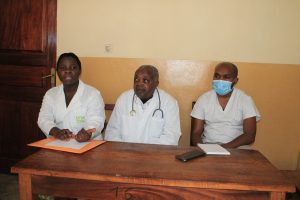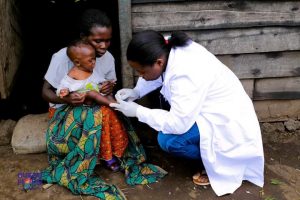Medical Doctor, Panzi Hospital
Improving the Management of Meningitis in Children

Prize Amount
$150,000 USD
Location
Bukavu, Democratic Republic of the Congo
Problem
The term “meningitis” describes inflammation of the membranes(meninges) and/or cerebrospinal fluid (CSF) that surrounds and protects the brain and spinal cord. The disease can be caused by many different pathogens including bacteria, fungi or viruses, but the highest global burden is seen with bacterial meningitis. Historically, up to 80% of bacterial meningitis cases are caused by Streptococcus pneumoniae (pneumococcus), haemophilus influenzae, and meningococcus.
Meningitis remains a major public health challenge, particularly in the Sub-Saharan region stretching from Senegal to Ethiopia, called the Meningitis Belt. Every year, bacterial meningitis epidemics affect more than 400 million people living in the 26 countries of the extended “African meningitis belt“. Over 900,000 cases were reported between 1995–2014 in this area, where 10% of these cases resulted in deaths and another 10–20% developed neurological sequelae, experiencing the heaviest burden of bacterial meningitis worldwide. According to the latest WHO data published in 2018, Meningitis Deaths in DR Congo reached 16,415 or 2.47% of total deaths. Bacterial meningitis epidemics have been reported in Africa for more than a century, with the highest rates of mortality observed in children under 5 years old.
In November 2020, The Defeating meningitis by 2030 global road map was approved by the Seventy-third session of the World Health Assembly and Jeannière Manegabe joined the Challenge.
Project Description
Dr. Manegabe will be initiating a prospective study of the germs responsible for bacterial meningitis in children under 5 years old. She will take samples of blood and cerebrospinal fluid from children who will be hospitalized in the pediatric department for suspected bacterial meningitis and then complete laboratory examinations including macroscopic and microscopic analysis of cerebrospinal fluid, culture of cerebrospinal fluid, venous blood culture, antibiogram and other blood tests necessary. The results will be analyzed and a management protocol will be established according to results.
Project Novelty
When science is based on research done in developed countries, it is important to understand and research the germs in developing areas, like the South Kivu province, which are not identical to those found in Europe. The study will determine what treatment is needed for children with bacterial meningitis in this specific locale. This is comparable to previous research completed by Dr. Manegabe on pneumonia among children under 5. Today at Panzi hospital, they are using the proposed protocol to treat pneumonia in the Pediatrics department.
Locally, the result of this study would be used to treat meningitis in children under 5. Globally, the world will be able to access this data and understand what is happening in the South Kivu province.
Project Lead
Jeanniere Manegabe is a young health professional from the Democratic Republic of Congo who received her doctorate degree in Medicine at the Evangelical University in Africa in 2015. In 2018, she was a Mandela Washington fellow at Indiana University, USA. She is passionate about children’s health because she believes that the future of the world lies with children. Since 2018, she has been completing her residency at the Evangelical University in Africa and works as an attending physician and researcher in the Department of Pediatrics at Panzi Hospital.
Organization
Founded in 1991, the Evangelical University in Africa is a non-profit public private partnership higher-education institution located in the urban setting of the large city of Bukavu, South Kivu. UEA is officially recognized by the Ministry of Higher and University Education of the Democratic Republic of the Congo .
Panzi Hospital serves as a university clinic for medical residents of the Evangelical University in Africa. Located in the extreme south of a growing city, the General Hospital of Reference of Panzi represents a pole of reference for the health sector in the city of Bukavu. Through its care, prevention, teaching and research missions, it is a place of expression of excellent medicine. It offers all current and specialized disciplines and has set techniques multidisciplinary meeting the most demanding medical requirements. Panzi Hospital is committed to a process of quality, safety of care and continuity of care for its patients.




